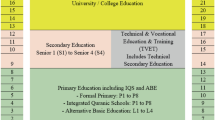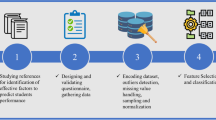Abstract
Student performance is a critical task in universities. By predicting student performance in the early stage, we can identify students who need more attention to improve their learning performance. Also, these forecast tasks support students to select appropriate courses and design good study plans for themselves to obtain higher performance. Previous studies usually use only one model for all kinds of students regardless of each student’s ability and characteristics. For multidisciplinary universities, this type of model can produce poor performance. In this study, we propose to consider 4-grade levels of degree classification in Vietnam, and the prediction is based on the average performance in previous semesters to perform the prediction tasks. Four student groups are trained separately with their mark records—the used model depends on students’ average marks in previous semesters. The proposed method is validated on more than 4.5 million mark records of nearly 100,000 students at a multidisciplinary university in Vietnam. The experimental results show that the four Random Forest-based models give a positive average mean absolute error of 0.452 of Random Forest regression comparing with the error of 0.557 while using one model.
Access this chapter
Tax calculation will be finalised at checkout
Purchases are for personal use only
Similar content being viewed by others
Notes
- 1.
- 2.
Can Tho University, 2020. Management Information System accessed on 12 May 2020. Available from https://htql.ctu.edu.vn/.
- 3.
https://scikit-learn.org/stable/modules/generated/sklearn.preprocessing.OrdinalEncoder.html, accessed on 31 March 2021.
References
Mat, U., Buniyamin, N., Arsad, P., Kassim, R.: An overview of using academic analytics to predict and improve students’ achievement: a proposed proactive intelligent intervention. In: 2013 IEEE 5th Conference on Engineering Education (ICEED) (2013). https://doi.org/10.1109/iceed.2013.6908316
Nguyen, T., Zucker, J.: Enhancing metagenome-based disease prediction by unsupervised binning approaches. In: 2019 11th International Conference on Knowledge and Systems Engineering (KSE) (2019). https://doi.org/10.1109/kse.2019.8919295
Rastrollo-Guerrero, J., Gómez-Pulido, J., Durán-Domínguez, A.: Analyzing and predicting students’ performance by means of machine learning: a review. Appl. Sci. 10, 1042 (2020). https://doi.org/10.3390/app10031042
Kim, B.-H., Vizitei, E., Ganapathi, V.: GritNet: student performance prediction with deep learning (2018). arXiv abs/1804.07405
Guo, B., Zhang, R., Xu, G., Shi, C., Yang, L.: Predicting students performance in educational data mining. In: 2015 International Symposium on Educational Technology (ISET) (2015). https://doi.org/10.1109/iset.2015.33
Tsiakmaki, M., Kostopoulos, G., Kotsiantis, S., Ragos, O.: Transfer learning from deep neural networks for predicting student performance. Appl. Sci. 10, 2145 (2020). https://doi.org/10.3390/app10062145
Huynh-Ly, T.-N., Thai-Nghe, N.: A system for predicting students’ course results using a free recommender system library of MyMediaLite (2013). (in Vietnamese). https://dspace.ctu.edu.vn/jspui/bitstream/123456789/997/1/HNHT/_2018/_002/_192-201.pdf
Iqbal, Z., Qadir, J., Mian, A., Kamiran, F.: Machine Learning Based Student Grade Prediction: A Case Study. Computers and Society (2017). arXiv abs/1708.08744v1
Kemper, L., Vorhoff, G., Wigger, B.: Predicting student dropout: a machine learning approach. Eur. J. High. Educ. 10, 28–47 (2020). https://doi.org/10.1080/21568235.2020.1718520
Abu Zohair, L.: Prediction of student’s performance by modelling small dataset size. Int. J. Educ. Technol. High. Educ. 16 (2019). https://doi.org/10.1186/s41239-019-0160-3
Dien, T., Hoai-Sang, L., Thanh-Hai, N., Thai-Nghe, N.: Course Recommendation with Deep Learning Approach. Future Data and Security Engineering. Big Data, Security and Privacy, Smart City and Industry 4.0 Applications, pp. 63–77 (2020). https://doi.org/10.1007/978-981-33-4370-2_5
Acknowledgment
Can Tho University funded this work under grant number TSV2021-40.
Author information
Authors and Affiliations
Corresponding author
Editor information
Editors and Affiliations
Rights and permissions
Copyright information
© 2021 The Author(s), under exclusive license to Springer Nature Switzerland AG
About this paper
Cite this paper
Dien, T.T. et al. (2021). Four Grade Levels-Based Models with Random Forest for Student Performance Prediction at a Multidisciplinary University. In: Barolli, L., Yim, K., Enokido, T. (eds) Complex, Intelligent and Software Intensive Systems. CISIS 2021. Lecture Notes in Networks and Systems, vol 278. Springer, Cham. https://doi.org/10.1007/978-3-030-79725-6_1
Download citation
DOI: https://doi.org/10.1007/978-3-030-79725-6_1
Published:
Publisher Name: Springer, Cham
Print ISBN: 978-3-030-79724-9
Online ISBN: 978-3-030-79725-6
eBook Packages: Intelligent Technologies and RoboticsIntelligent Technologies and Robotics (R0)




